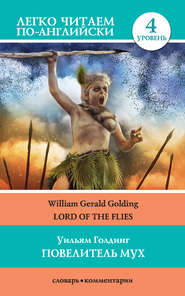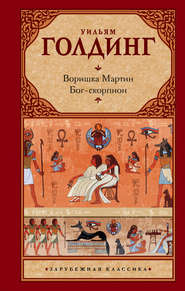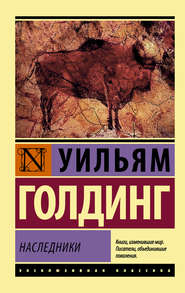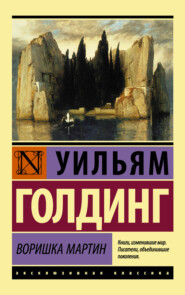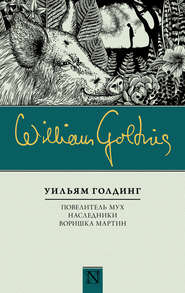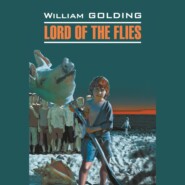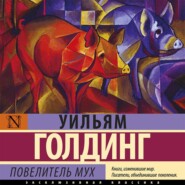По всем вопросам обращайтесь на: info@litportal.ru
(©) 2003-2025.
✖
Повелитель мух / Lord of the Flies
Настройки чтения
Размер шрифта
Высота строк
Поля
“Choir! Stand still!”
Wearily obedient, the choir huddled into line and stood there swaying in the sun. None the less, some began to protest faintly.
“But, Merridew. Please, Merridew … can’t we?”
Then one of the boys flopped on his face in the sand and the line broke up. They heaved the fallen boy to the platform and let him lie. Merridew, his eyes staring, made the best of a bad job.
“All right then. Sit down. Let him alone.”
“But Merridew.”
“He’s always throwing a faint[6 - throwing a faint – жалуется],” said Merridew. “He did in Gib.; and Addis; and at matins over the precentor.”
This last piece of shop brought sniggers from the choir, who perched like black birds on the criss-cross trunks and examined Ralph with interest. Piggy asked no names. He was intimidated by this uniformed superiority and the offhand authority in Merridew’s voice. He shrank to the other side of Ralph and busied himself with his glasses.
Merridew turned to Ralph.
“Aren’t there any grownups?”
“No.”
Merridew sat down on a trunk and looked round the circle.
“Then we’ll have to look after ourselves.”
Secure on the other side of Ralph, Piggy spoke timidly.
“That’s why Ralph made a meeting. So as we can decide what to do. We’ve heard names. That’s Johnny. Those two—they’re twins, Sam ’n Eric. Which is Eric—? You? No— you’re Sam—”
“I’m Sam—”
“’n I’m Eric.”
“We’d better all have names,” said Ralph, “so I’m Ralph.”
“We got most names,” said Piggy. “Got ’em just now.”
“Kids’ names,” said Merridew. “Why should I be Jack? I’m Merridew.”
Ralph turned to him quickly. This was the voice of one who knew his own mind.
“Then,” went on Piggy, “that boy—I forget—”
“You’re talking too much,” said Jack Merridew. “Shut up, Fatty.”
Laughter arose.
“He’s not Fatty,” cried Ralph, “his real name’s Piggy!”
“Piggy!”
“Piggy!”
“Oh, Piggy!”
A storm of laughter arose and even the tiniest child joined in. For the moment the boys were a closed circuit of sympathy with Piggy outside: he went very pink, bowed his head and cleaned his glasses again.
Finally the laughter died away and the naming continued. There was Maurice, next in size among the choir boys to Jack, but broad and grinning all the time. There was a slight, furtive boy whom no one knew, who kept to himself with an inner intensity of avoidance and secrecy. He muttered that his name was Roger and was silent again. Bill, Robert, Harold, Henry; the choir boy who had fainted sat up against a palm trunk, smiled pallidly at Ralph and said that his name was Simon.
Jack spoke.
“We’ve got to decide about being rescued.”
There was a buzz. One of the small boys, Henry, said that he wanted to go home.
“Shut up,” said Ralph absently. He lifted the conch. “Seems to me we ought to have a chief to decide things.”
“A chief! A chief!”
“I ought to be chief,” said Jack with simple arrogance, “because I’m chapter chorister and head boy. I can sing C sharp.”
Another buzz.
“Well then,” said Jack, “I—”
He hesitated. The dark boy, Roger, stirred at last and spoke up.
“Let’s have a vote.”
“Yes!”
“Vote for chief!”
“Let’s vote—”
This toy of voting was almost as pleasing as the conch. Jack started to protest but the clamor changed from the general wish for a chief to an election by acclaim of Ralph himself. None of the boys could have found good reason for this; what intelligence had been shown was traceable to Piggy while the most obvious leader was Jack. But there was a stillness about Ralph as he sat that marked him out: there was his size, and attractive appearance; and most obscurely, yet most powerfully, there was the conch. The being that had blown that, had sat waiting for them on the platform with the delicate thing balanced on his knees, was set apart.
“Him with the shell.”
“Ralph! Ralph!”
“Let him be chief with the trumpet-thing.”
Ralph raised a hand for silence.
“All right. Who wants Jack for chief?”
With dreary obedience the choir raised their hands.
Wearily obedient, the choir huddled into line and stood there swaying in the sun. None the less, some began to protest faintly.
“But, Merridew. Please, Merridew … can’t we?”
Then one of the boys flopped on his face in the sand and the line broke up. They heaved the fallen boy to the platform and let him lie. Merridew, his eyes staring, made the best of a bad job.
“All right then. Sit down. Let him alone.”
“But Merridew.”
“He’s always throwing a faint[6 - throwing a faint – жалуется],” said Merridew. “He did in Gib.; and Addis; and at matins over the precentor.”
This last piece of shop brought sniggers from the choir, who perched like black birds on the criss-cross trunks and examined Ralph with interest. Piggy asked no names. He was intimidated by this uniformed superiority and the offhand authority in Merridew’s voice. He shrank to the other side of Ralph and busied himself with his glasses.
Merridew turned to Ralph.
“Aren’t there any grownups?”
“No.”
Merridew sat down on a trunk and looked round the circle.
“Then we’ll have to look after ourselves.”
Secure on the other side of Ralph, Piggy spoke timidly.
“That’s why Ralph made a meeting. So as we can decide what to do. We’ve heard names. That’s Johnny. Those two—they’re twins, Sam ’n Eric. Which is Eric—? You? No— you’re Sam—”
“I’m Sam—”
“’n I’m Eric.”
“We’d better all have names,” said Ralph, “so I’m Ralph.”
“We got most names,” said Piggy. “Got ’em just now.”
“Kids’ names,” said Merridew. “Why should I be Jack? I’m Merridew.”
Ralph turned to him quickly. This was the voice of one who knew his own mind.
“Then,” went on Piggy, “that boy—I forget—”
“You’re talking too much,” said Jack Merridew. “Shut up, Fatty.”
Laughter arose.
“He’s not Fatty,” cried Ralph, “his real name’s Piggy!”
“Piggy!”
“Piggy!”
“Oh, Piggy!”
A storm of laughter arose and even the tiniest child joined in. For the moment the boys were a closed circuit of sympathy with Piggy outside: he went very pink, bowed his head and cleaned his glasses again.
Finally the laughter died away and the naming continued. There was Maurice, next in size among the choir boys to Jack, but broad and grinning all the time. There was a slight, furtive boy whom no one knew, who kept to himself with an inner intensity of avoidance and secrecy. He muttered that his name was Roger and was silent again. Bill, Robert, Harold, Henry; the choir boy who had fainted sat up against a palm trunk, smiled pallidly at Ralph and said that his name was Simon.
Jack spoke.
“We’ve got to decide about being rescued.”
There was a buzz. One of the small boys, Henry, said that he wanted to go home.
“Shut up,” said Ralph absently. He lifted the conch. “Seems to me we ought to have a chief to decide things.”
“A chief! A chief!”
“I ought to be chief,” said Jack with simple arrogance, “because I’m chapter chorister and head boy. I can sing C sharp.”
Another buzz.
“Well then,” said Jack, “I—”
He hesitated. The dark boy, Roger, stirred at last and spoke up.
“Let’s have a vote.”
“Yes!”
“Vote for chief!”
“Let’s vote—”
This toy of voting was almost as pleasing as the conch. Jack started to protest but the clamor changed from the general wish for a chief to an election by acclaim of Ralph himself. None of the boys could have found good reason for this; what intelligence had been shown was traceable to Piggy while the most obvious leader was Jack. But there was a stillness about Ralph as he sat that marked him out: there was his size, and attractive appearance; and most obscurely, yet most powerfully, there was the conch. The being that had blown that, had sat waiting for them on the platform with the delicate thing balanced on his knees, was set apart.
“Him with the shell.”
“Ralph! Ralph!”
“Let him be chief with the trumpet-thing.”
Ralph raised a hand for silence.
“All right. Who wants Jack for chief?”
With dreary obedience the choir raised their hands.






